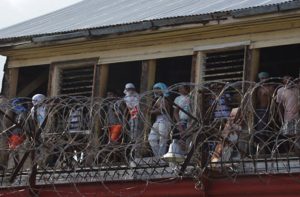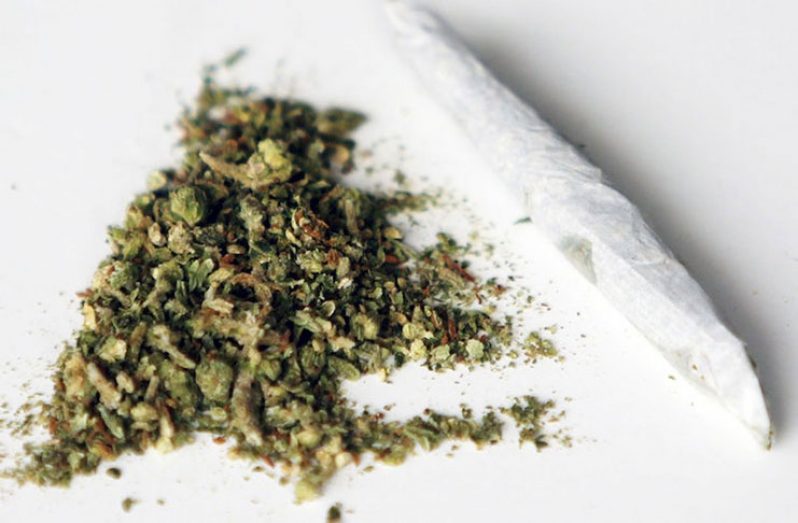CABINET’s approval of the proposal to remove custodial sentences for 30 grams or less of marijuana is a step in the right direction towards reducing the high number of youths imprisoned for cannabis sativa (marijuana), and the age-old distress of overcrowding in prisons. The July 2, 2019 decision of Cabinet marks the “first of several steps that government intends to take” in this regard.
President David Granger has always held the belief that persons ought not to be incarcerated for possession of small quantities of the plant for personal use. Despite the many challenges involved with bringing about the change, he has long indicated the interest.
Each year, and for many years, scores of Guyanese both young and old have been thrown in jail for the simple possession of a “joint”.
In 2016, during the handing over of the Camp Street Prison Riot Commission of Inquiry report, the President stated that no President would be happy to see large numbers of young people spend so much of their lives incarcerated.
According to the Guyana Times of July 05, 2016 he indicated that the Government would “direct its efforts towards ensuring the country becomes a safer place” and “expressed hope that fewer children, men and women will end up in the country’s prisons.”
For the first time, a quantity for consideration has been named by Cabinet.
The Ministry of the Presidency has explained that the draft amendments of the Narcotics Drug and Psychotropic Substances (Control) (Amendment) Bill 2015 were presented to Cabinet on 30, April 2019 and, following the necessary process, has now been made public.
“This is the first in a series of actions that has to be taken to ensure the proposed changes are enacted. Before a Bill is sent to the National Assembly, it has to be approved by Cabinet. If there are any changes, it is sent to the Attorney General’s Chambers. However, once the final draft has been approved by Cabinet, it is added to the National Assembly’s Order Papers, read, debated and then voted on. The approval of the proposal therefore does not render it law; it is simply the first step,” the Ministry explained.
It matches the intention of the President who stated in 2016: “We would want to have a good debate on whether a person should be sent to jail, given custodial sentence for possession of such a small quantity of marijuana when it is clear that it is only for personal use and not for trafficking.”
The year before, the Bill to remove custodial sentences for possession of small amounts of marijuana was brought to the National Assembly by Alliance For Change (AFC) member, Michael Carrington.
At the time, Carrington had emphasised that the Bill was not about legalising cannabis but about reducing the “hundreds of people in Guyana” sentenced to jail for three years or more for “smoking a joint” or being in possession of small quantities of cannabis.
Minister of Public Security, Khemraj Ramjattan has since indicated that the Bill needs to be refined.
CONTRADICTIONS
However, it is perplexing that while the Government and the Opposition — in a rare instance — see eye-to-eye on the marijuana issue, the Opposition Leader, Bharrat Jagdeo still believes that the recent move of the Government is “another promise that was broken.”
Both parties do not support the production, sale, export or the general decriminalization of marijuana but want custodial sentences removed for small quantities.

Yet, a release from the PPP on June 02, following the government’s announcement, stated that the “David Granger-led Coalition has had over four years to address the issue of removing custodial sentences for possession of small quantities of marijuana” but “failed to do so”.
The Party instead highlighted its own efforts in its 2015 manifesto to include the need for the reviewing of the possession of small quantities of marijuana.
However, some are questioning the worth of the PPP’s recent push for the same when from 1993 when Jagdeo became a Member of Parliament and from 1999 to 2011 when he served as President, he made no notable efforts to champion the cause.
Even more interesting is his previous ‘cold’ approach to the marijuana issue prior to the 2015 elections.
This is evident in his statements made in July 2011 at the launch of the International Year for People of African Descent (IYPAD).
“This marijuana business… I think it will outlive my presidency, there will be no change in the law whilst I am here,” then President Jagdeo told members of the media.
Earlier in the ceremony, President of the Guyana Rastafari Council, Ras Leon Saul had lobbied for consideration to lift the prohibition on the substance which the Rastafari community values as a “sacrament.”
In 2014, the Kaieteur News reported that the then PPP Government disregarded CARICOM’s urging for the setting up of a National Marijuana Commission and could not state when discussions on the matter would be held.
“It remains illegal here and up until those change, we will actively pursue those who cultivate and supply it,” former Home Affairs Minister, Clement Rhoee had told the media.
In December 2015, with a change of government, the local Rastafarian organisations engaged Attorney General and Minister of Legal Affairs, Basil Williams on marijuana laws and human rights violations.
It was the same year that Carrington had tabled the Bill in the National Assembly for debate.
In 2018, speaking to the topic once more, the Regional Commission on Marijuana made recommendations for the decriminalization of marijuana across CARICOM Member States but in controlled and regulated amounts.
As a result, President David Granger indicated that amendments will be made to the Act to allow for the removal of jail time for the possession of small amounts of marijuana.
“We are moving towards the removal of custodial sentences for the possession of small amounts of marijuana,” he told Guyana Chronicle
“We are not moving towards encouraging the industrialisation of marijuana production. I think that is a little premature in the context of Guyana, and we have vast landscape in comparison with some of the Caribbean Island states, we have challenges for enforcement and challenges for control of that land space, and it will be very difficult for Guyana to embark on that course at the present time. So we are moving towards the removal of the custodial sentences, we are not moving towards the encouragement of the use of marijuana.”
This is still the position of the government but the Ministry of the Presidency has made it clear that it is only the proposal that has been approved thus far; possession is still illegal.
Furthermore, should the proposal be eventually agreed upon, it is not that the possession of the quantity of marijuana will be legal but “custodial sentences for 30 grams or less of marijuana” will be removed.
The government believes that this position maintains the goal of reducing those incarcerated in relation to the possession for small quantities of marijuana for personal use and moves steps closer towards ensuring “Rastafarian brothers and sisters who require [marijuana] for use in their worship and sacrament” are considered.



.jpg)








